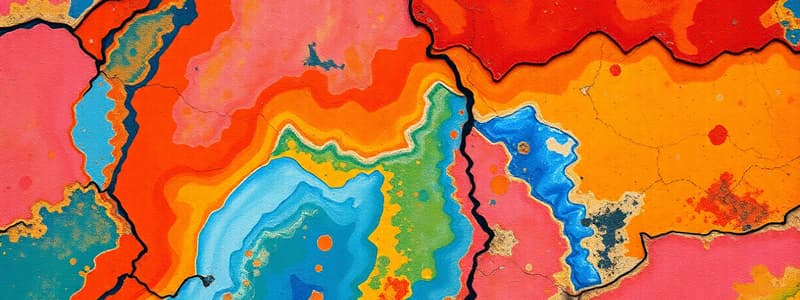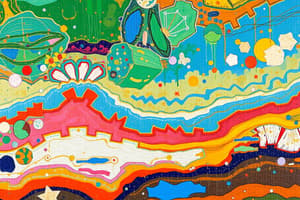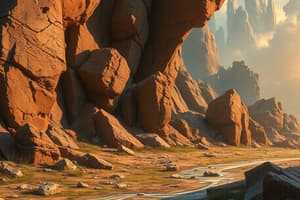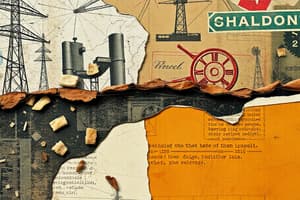Podcast
Questions and Answers
What is the primary role of erosion in the landscape?
What is the primary role of erosion in the landscape?
- Erosion builds new landforms over time.
- Erosion involves the removal of weathered rock and soil. (correct)
- Erosion is a process that only occurs in dry areas.
- Erosion converts sediment into fertile soil.
How does running water contribute to erosion?
How does running water contribute to erosion?
- It creates permanent lakes that prevent erosion.
- It can reshape landscapes and transport sediment. (correct)
- It only erodes during heavy rainfall.
- It primarily causes soil compaction.
What is deposition in the context of geologic processes?
What is deposition in the context of geologic processes?
- The process of breaking down rocks.
- The dropping of eroded materials in a new location. (correct)
- The accumulation of soil in riverbeds.
- The movement of sediment away from a beach.
Which agent of erosion has the capacity to transport large amounts of soil and rock on a grand scale?
Which agent of erosion has the capacity to transport large amounts of soil and rock on a grand scale?
What negative impact can human development have on coastal erosion?
What negative impact can human development have on coastal erosion?
What is the main difference between mechanical weathering and chemical weathering?
What is the main difference between mechanical weathering and chemical weathering?
Which process is described as the freeze-thaw cycle of water in cracks of rocks?
Which process is described as the freeze-thaw cycle of water in cracks of rocks?
How does temperature and precipitation affect the rate of weathering?
How does temperature and precipitation affect the rate of weathering?
What effect does the surface area of rocks have on weathering?
What effect does the surface area of rocks have on weathering?
What type of weathering occurs when outer rock layers are stripped away?
What type of weathering occurs when outer rock layers are stripped away?
What role does water play in chemical weathering?
What role does water play in chemical weathering?
Which of the following describes the chemical reaction of oxygen with other substances?
Which of the following describes the chemical reaction of oxygen with other substances?
Which factor does NOT influence the rate of weathering?
Which factor does NOT influence the rate of weathering?
Flashcards
Weathering
Weathering
The process of breaking down rocks and minerals through physical or chemical means.
Erosion
Erosion
The movement of weathered rock and soil from one location to another.
Deposition
Deposition
The process of depositing eroded material in a new location.
Gravity as an agent of erosion
Gravity as an agent of erosion
Signup and view all the flashcards
Human impact on erosion
Human impact on erosion
Signup and view all the flashcards
Mechanical Weathering
Mechanical Weathering
Signup and view all the flashcards
Chemical Weathering
Chemical Weathering
Signup and view all the flashcards
Frost Wedging
Frost Wedging
Signup and view all the flashcards
Exfoliation
Exfoliation
Signup and view all the flashcards
Oxidation
Oxidation
Signup and view all the flashcards
Carbonic Acid
Carbonic Acid
Signup and view all the flashcards
Climate's Impact on Weathering
Climate's Impact on Weathering
Signup and view all the flashcards
Study Notes
Weathering
- Weathering is the process where materials on or near Earth's surface break down and change.
- Mechanical weathering breaks rocks into smaller pieces without changing their composition.
- Chemical weathering changes the composition of rocks and minerals.
Mechanical Weathering
- Temperature: Freeze-thaw cycles (frost wedging) cause water in cracks to expand, breaking rocks.
- Pressure: Removal of overlying rock reduces pressure, causing rocks to expand and break.
- Exfoliation: Outer rock layers peel off, often forming dome-shaped formations.
- Topography: Land shape and slope affect erosion rates.
Chemical Weathering
- Water: Dissolves many minerals and rocks, creating a medium for chemical reactions.
- Oxygen: Chemical reactions with oxygen are called oxidation.
- Carbon Dioxide: Combining with water forms carbonic acid, which dissolves rocks like limestone and marble.
- Acid Precipitation: Slightly acidic precipitation dissolves certain rocks.
Rates of Weathering
- Climate: Interactions of temperature and precipitation determine weathering rates; warm areas have faster chemical weathering and cool areas faster physical weathering.
- Rock Type: Different rocks weather at different rates.
- Surface Area: More surface area allows for more chemical weathering.
- Topography: Steep slopes increase weathering and erosion.
Erosion and Deposition
- Erosion: The process of removing weathered rock and soil from its original location. Erosion happens due to water, glaciers, wind, waves, and gravity.
- Deposition: Eroded rock and soil are dropped in a new location
Agents of Erosion
- Water: Stream erosion shapes landscapes.
- Waves: Carve cliffs, arches, and other features along coastlines.
- Wind: Picks up and moves fine, dry particles.
- Glaciers: Can erode vast amounts of material over large areas.
- Gravity: Pulls materials downslope.
Deposition
- Water: Rivers deposit sediment near the ocean.
- Waves: Deposit sand, forming beaches and sandbars.
- Glaciers: Deposit sediments, forming soils.
- Wind: Forms dunes by depositing sand.
Human Impact
- Humans move sediment during construction.
- Human development along shorelines affects erosion.
- Efforts to control erosion can disrupt sand migration.
Studying That Suits You
Use AI to generate personalized quizzes and flashcards to suit your learning preferences.




